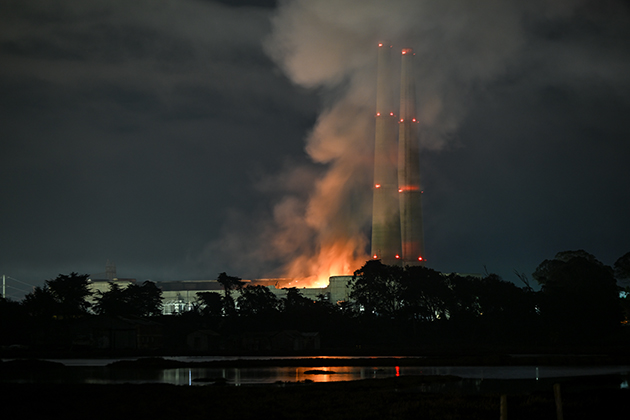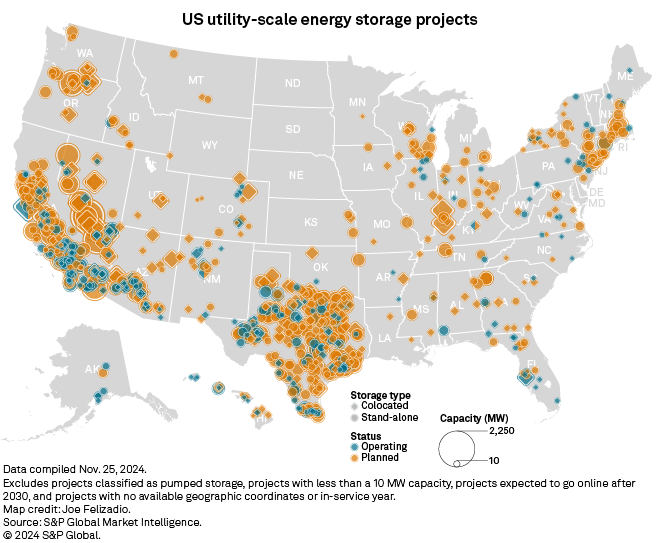S&P Global Offerings
Featured Topics
Featured Products
Events
S&P Global Offerings
Featured Topics
Featured Products
Events
S&P Global Offerings
Featured Topics
Featured Products
Events
Banking & Capital Markets
Economy & Finance
Energy Transition & Sustainability
Technology & Innovation
Podcasts & Newsletters
Banking & Capital Markets
Economy & Finance
Energy Transition & Sustainability
Technology & Innovation
Podcasts & Newsletters
S&P Global Offerings
Featured Topics
Featured Products
Events
21 Jan, 2025

| Vistra's Moss Landing battery storage system in Monterey County, California, suffered major damage in a Jan. 16 fire. Source: Tayfun Coskun/Anadolu via Getty Images. |
A runaway fire at Vistra Corp.'s 750-MW/3-GWh Moss Landing Battery Storage Facility in Monterey County, California, on Jan. 16 destroyed a large portion of one of the biggest lithium-ion battery stations in the world.
The blaze triggered a temporary evacuation of the surrounding area and consumed most of a 300-MW/1,200-MWh phase of the complex, including roughly 80% of the batteries and the building housing them, North County Fire Protection District Chief Joel Mendoza said Jan. 18 during a media briefing near the site. Two other phases were not damaged but were taken offline, Mendoza said, along with Vistra's colocated 1,020-MW natural gas-fired Moss Landing power plant and Pacific Gas and Electric Co.'s (PG&E's) adjacent 182.5-MW/730-MWh Elkhorn battery system.
The fire was the third and most severe failure at the Vistra Moss Landing battery project; overheating events in September 2021 and February 2022 caused monthslong outages at the facility. The PG&E system experienced a smaller fire in September 2022.
"I have a lot of doubts right now about where we're at [with] this technology," Glenn Church, a member of Monterey County's board of supervisors, said at the briefing.
Church acknowledged the significance of battery storage in California's integration of greater volumes of variable renewable energy but said the county would review its permitting process to ensure that "we go forward here in a path where we're not going to have accidents of this type happen."
"We can never have a fire like this, or a battery energy storage system failure like this, ever again in the future," California state Assemblymember Dawn Addis said. Addis called for a "full outside investigation into what happened."
Vistra is focused on ensuring the site is safe before teams can enter to begin an investigation, according to Brad Watson, the company's director of community affairs.
"We don't know what happened, so I'm not going to speculate on that," Watson said.
The official declined to comment on whether Vistra would seek to rebuild the destroyed first phase of the roughly $1 billion project, which is underpinned by long-term contracts with PG&E, the operating arm of PG&E Corp.
'Certainly concerned'
The Golden State leads the US with 11,859 MW of total installed large-scale battery power capacity installed as of late November 2024, according to S&P Global Market Intelligence data. Including residential, commercial and utility-scale systems, California's operating battery fleet spanned 196,468 installations combining for 13,391 MW as of September 2024, state data shows.
Power plants of all kinds experience plant troubles that reduce available capacity, including battery systems, as illustrated by California ISO daily outage reports. But only a fraction of California's big batteries have experienced serious failures that have jeopardized safety.
A database maintained by the Electric Power Research Institute (EPRI) includes 91 battery system failure incidents globally, nine of which occurred in California. But the rate of failures has dropped dramatically as deployments have accelerated, the EPRI database indicates. Failure incidents at commercial and utility-scale systems include overheating, fires and explosions that have resulted from battery defects, safety system malfunctions and other problems.
Vistra's 300-MW first phase at Moss Landing is approximately four years old and includes batteries from LG Energy Solution Ltd., with Fluence Energy Inc. serving as the original system integrator, according to the EPRI database.
"We are certainly concerned about the negative attention this brings to the industry," Scott Murtishaw, executive director of the California Energy Storage Alliance (CESA), said in an interview the day after the latest Moss Landing incident.
CESA represents companies active in California's energy storage industry, including Vistra, Fluence and Tesla Inc.
Fluence did not immediately reply to a request for comment on the incident.

Potential speedbump
The Moss Landing fire could lead to greater scrutiny of battery facilities by local permitting agencies and fire officials, even though the Vistra facility was designed prior to the adoption of the National Fire Protection Agency's standard for stationary energy storage, Murtishaw said.
"Facilities being built today represent a more mature phase of the industry," he said. Given the need to add new resources to the grid to meet rising demand from datacenters, electric vehicles and new manufacturing facilities, "it's not conceivable to stop installing energy storage."
Analysts at Jefferies, however, see the potential for California battery storage deployments to hit a speedbump as a result of the incident.
"Expect a real review of fire standards and permitting in California," they said in a Jan. 17 note to clients. "Related, we anticipate this to add only more permitting challenges on fire department review grounds on a range of deployments nationally."
Although Vistra and Fluence share prices both dropped after the incident, given the risk of liabilities, Jefferies analysts see a bigger threat for Fluence.
"The implications for Fluence are potentially more significant, depending on the cause of the fire, as this is another high-profile fire at a facility it worked on," the analysts said.
Ric O'Connell, executive director of GridLab, a nonprofit group that advises policymakers and others on technical issues, in an emailed statement called the Moss Landing fire "a stark reminder that safety cannot be sacrificed for progress."
The outdated design of the Moss Landing facility highlights the need to modernize existing facilities, he added.
"While such fires are rare, Vistra's repeated safety failures demand accountability and thorough investigation to prevent future incidents," O'Connell said.

